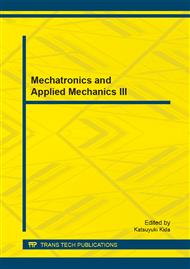[1]
A.R. Sarin , and M. Sharma, Jatropha Palm biodiesel blends: An optimum mix for Asia, Fuel., 86, 2007, pp.1365-1371.
DOI: 10.1016/j.fuel.2006.11.040
Google Scholar
[2]
A .K. Agarwal, and L. M. Das, Biodiesel development and characterization for use as a fuel in C.I. Engine, Journal Of Engineering, Gas Turbine And Power (ASME)., 123, 2000, pp.440-447.
Google Scholar
[3]
T. Murayama, Y. Fujiwara, and T. Noto, Evaluating waste vegetable oils as a diesel fuel, IMechE Part D., 214, 2000, p.141–148.
DOI: 10.1177/095440700021400203
Google Scholar
[4]
A.S. Ramadhas, S. Jayaraj, and C. Muraleedharan, Use of Vegetable Oils as I. C engine Fuels a Review, Renewable Energy., 29, 2004, pp.727-742.
DOI: 10.1016/j.renene.2003.09.008
Google Scholar
[5]
Y. D. Wang, Al-Shemmeri, P. Eames, J. McMullan, N. Hewitt, Y. Huang , & S. Rezvani , An experimental investigation of the performance and gaseous exhaust emissions of a diesel engine using blends of a vegetable oil", Appl Therm Eng., 26, 2006, p.1684.
DOI: 10.1016/j.applthermaleng.2005.11.013
Google Scholar
[6]
A.S. Huzayyin, A. H. Bawady, M. A. Rady, and A. Dawood Experimental evaluation of diesel engine performance and emission using blends of jojoba oil and diesel fuel, Energy Conver Manage., 45, 2004, p.2093–2112.
DOI: 10.1016/j.enconman.2003.10.017
Google Scholar
[7]
C. D. Rakopoulos, K. A. Antonopoulos , D.T. Hountalas, and E.G. Giakoumis, Comparative performance and emissions study of a direct injection diesel engine using blends of diesel fuel with vegetable oils or bio-diesels of various origins, Energy Conversion and Management , 47, 2006, p.3272.
DOI: 10.1016/j.enconman.2006.01.006
Google Scholar
[8]
L. T. Baldassarri, L. Chiara, Battistell., L. Conti.R. Crebelli, and B. D Berardis, Emission comparison of urban bus engine fueled with diesel oil and biodiesel blend, Sci Tot Environ., 327, 2004, p.147–162.
DOI: 10.1016/j.scitotenv.2003.10.033
Google Scholar
[9]
Lyes Tarabet, Khaled Loubar, Mohand Said Lounici and Samir Hanchi, Eucalyptus Biodiesel as an Alternative to Diesel Fuel: Preparation and Tests on DI Diesel Engine, Journal of Biomedicine and Biotechnology., 2012, pp.1-8.
DOI: 10.1155/2012/235485
Google Scholar
[10]
P.K. Devan and N.V. Mahalakshmi, Performance, emission and combustion characteristics of poon oil and its diesel blends in a DI diesel engine, Fuel., 88, 2009, p.861–7.
DOI: 10.1016/j.fuel.2008.11.005
Google Scholar


